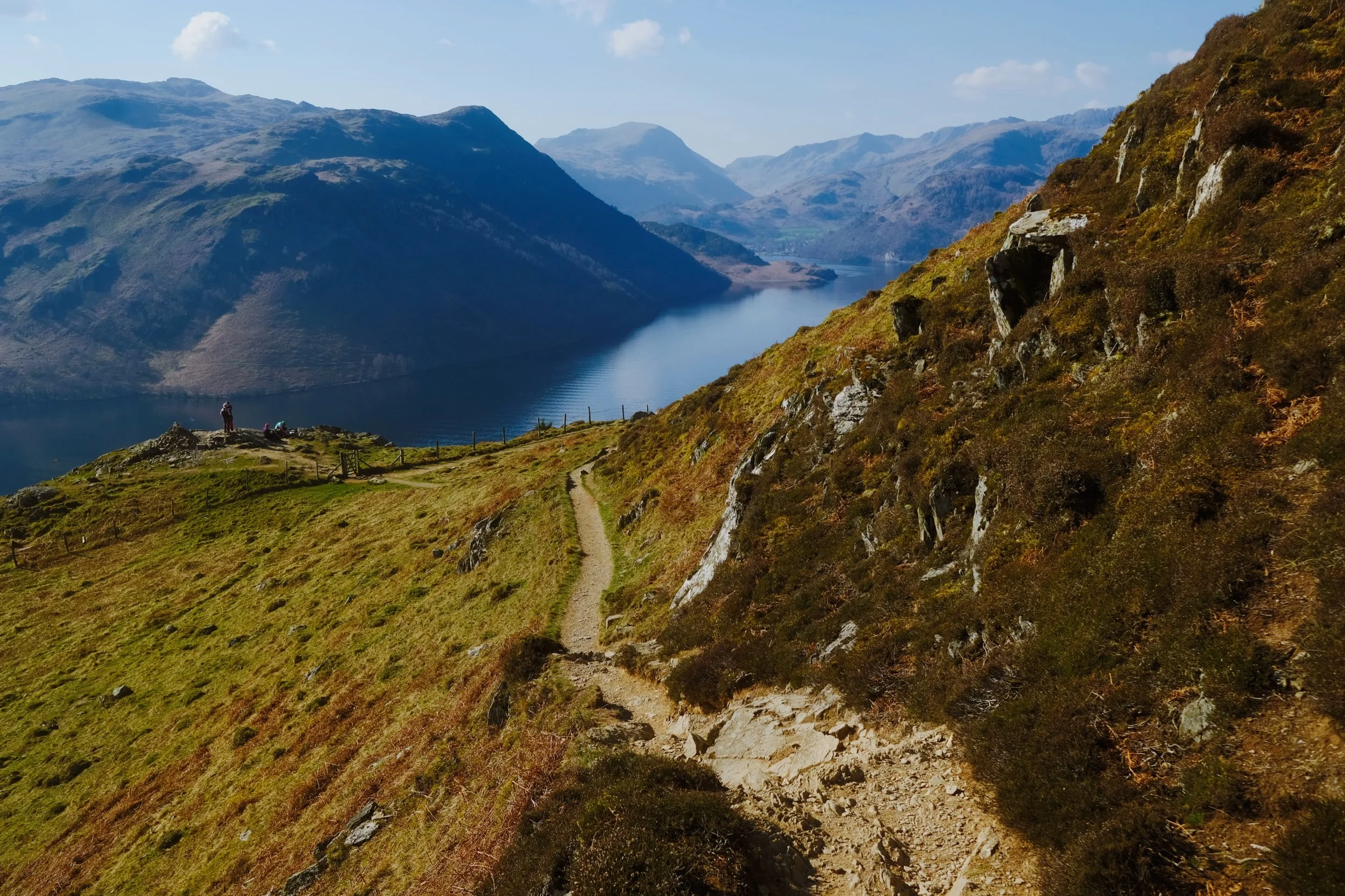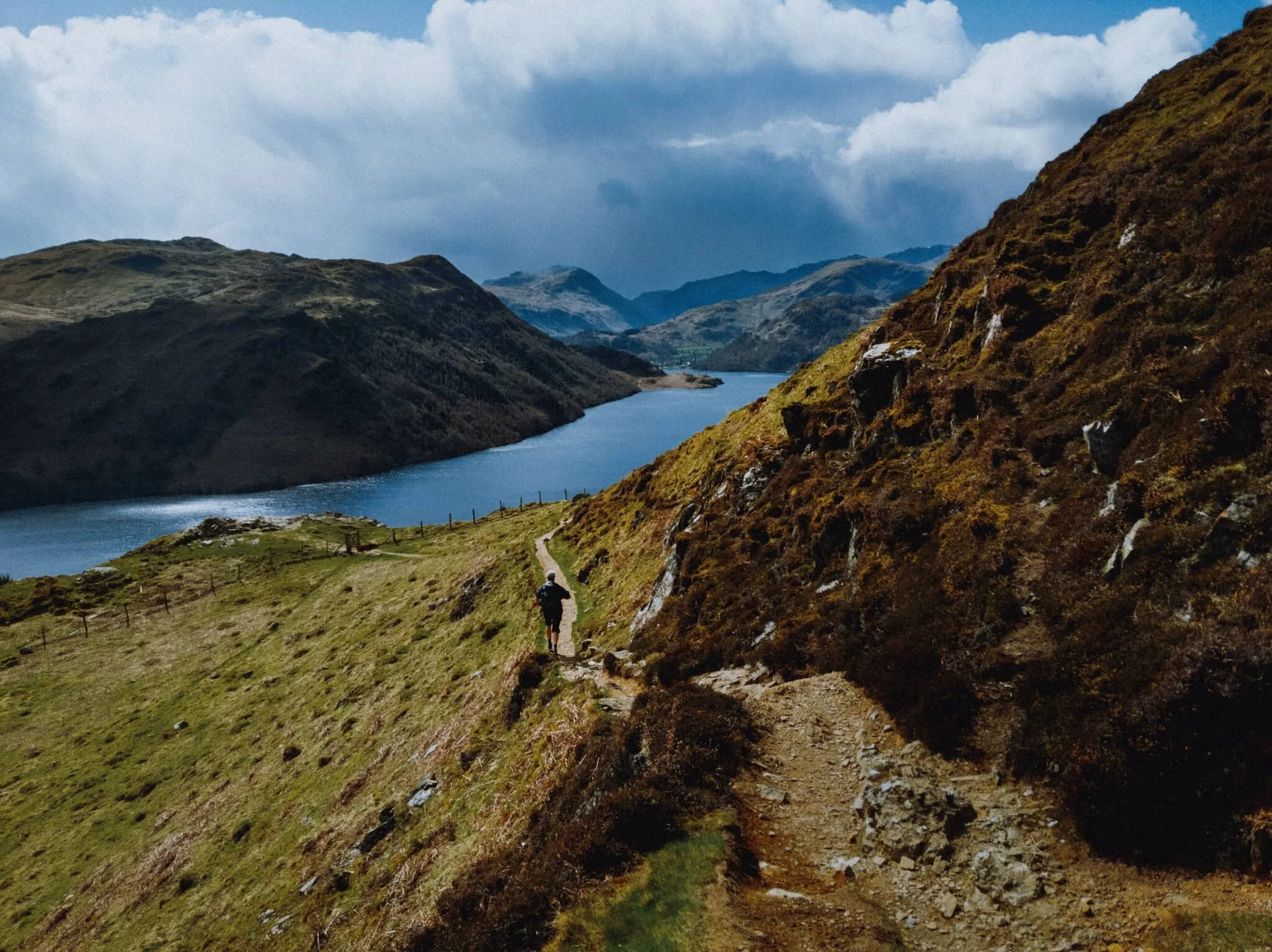Gowbarrow, Lake District, Spring
Spring has changed very quickly in the UK.
Spring has changed very quickly in the UK.
A couple of weeks ago temperatures barely rose above 10ºC, often settling in at around 5–7ºC. Within the last week, temperatures have suddenly risen to 15ºC with clear skies and barely a breeze. Today, the weather nearly hit 20ºC.
Spring is very weird in the UK these days. That gradual transition from winter to spring doesn’t seem to happen anymore. Instead, after months of sub-5ºC conditions and plenty of rain, you’ll get a week in March or April where it feels a switch has been flicked and temperatures suddenly leap 10 degrees.
Weird.
Well, with a rare free day in current circumstances, Lisabet and I decided to get up early and head to Ullswater for a steep but rewarding hike up Gowbarrow Fell. The last time we visited this fell was back in April of 2021. The weather could not have been more different.
Thankfully, on this occasion, all of my batteries were fully charged and working. What a glorious morning’s hike we had.
All photos shot on my Fujifilm X-T2 using two of my prime lenses: a Fujinon 23mm f/2.0 and an adapted Pentax SMC 55mm f/2.0. Images made 80% in-camera using the Velvia film simulation, then finished off in Affinity Photo.
A dead tree provides a wonderful subject and contrast against the deep blue sky. A flock of Swaledales wearily judge us in the distance.
One of the many deep cascades along Aira Beck at High Cascades, before the river then plunges down the spectacular Aira Force.
These Swaledale yows moved a comfortable distance away from us for a good hard stare.
Beyond High Cascades the path turns east and climbs sharply up the fellside of Gowbarrow. Herdwick sheep were everywhere. I’ve missed those faces.
Unlike Swaledales, Herdwicks aren’t too fussed about being too near humans. I managed to snap this composition of some Herdwicks chilling in the glorious spring sunshine with the Ullswater fells in the distance.
The going was steep, but the views grew increasingly spectacular as we climbed up the fellside.
Aaaaaand summit! The summit of Gowbarrow Fell is known as Airy Crag, appropriately named, and reaches 481 m (1,578 ft) above sea level. The views here are all-encompassing, especially look southwest towards the Helvellyn fells.
I snapped on me 55mm lens for some tighter, zoomed in compositions. From the summit of Gowbarrow Fell and clear view towards Blencathra (868 m/2,848 ft) above Keswick can be appreciated.
After the summit it was a simple task of following the narrow winding footpath around Gowbarrow’s northern and eastern shoulder. In places, the drop from the footpath is rather precipitous.
Lisabet pauses to check on my progress, so I snapped this composition. Truly glory awaits us around the corner…
Hundreds of metres below us the Ullswater Steamers begin the first of many travels across the lake.
And there it is. In my view, one of the grandest views in all of the Lake District. Ullswater and the Helvellyn fells.
Who can resist pausing for a rest and some photos, with a view like that?
Gowbarrow Fell, Lake District, Spring
Spring conditions are somewhat changeable at the moment.
Spring conditions are somewhat changeable at the moment.
Lisabet and I have been somewhat fortunate with this week-long extended Easter break. The first few days were relatively balmy for Cumbria, peaking at around 15°C. By Good Friday an “arctic blast” was arriving from the north, and temperatures quickly dropped by around 10°C or so. Despite the swing in climate conditions, the sky has remained consistently free of clouds.
This changed today and forecasts were warning of intermittent, and possibly heavy, snow squalls drifting through the county. We had originally planned for a hike around one of our favourite valleys, Mallerstang, but a sudden rush of inspiration from Lisabet meant heading up and over Kirkstone Pass towards Ullswater.
We quickly charted a route above the epic Aira Force, stopping to pay a quick visit to High Force, then out of the woods beyond High Cascades and up onto the shoulder of Gowbarrow Fell (481 m/1,578 ft). Then we would summit at Airy Crag, observe the Ullswater Way all the way around the eastern shoulder of the fell, and follow the track down the hill’s southern face, with sweeping views of Ullswater and the Helvellyn fells all the way.
What followed was an experience that ranked in our top three fell walks of all time. Absolutely glorious.
The only downside is that not long after starting the ascent up Gowbarrow Fell, my camera ran out of battery charge. I very much assumed I had enough charge, but temperatures barely above freezing point quickly saw to that. Thankfully my Google Pixel 3XL can shoot RAW files, which I relied on for the rest of the hike.
This is a fell we will definitely be revisiting, especially in late-summer when all the lovely pink heather will be blooming.
Photos shot on my Fujifilm X-T2, using a Samyang 35mm f/1.2 lens and Laowa 9mm f/2.8 lens, as well as my Google Pixel 3XL. Developed using RNI’s Kodachrome film profiles.
We parked in a National Trust lay-by not too far from Glencoyne Bay. I had a quick wander down towards the shore of Ullswater, knowing that at this time of year there’d be daffodils aplenty nearby. I weren’t wrong.
It was a gusty day, with the thermometer rarely reaching above 4°C. The wind chill factor pushed that number below freezing, feeling very raw on the face. Fortunately it made light conditions very changeable, which I always really enjoy. I adore watching the light scan and caress the fells.
In the woods of the Aira Force gorge, with one of my favourite trees in view. It puts me in mind of a pair of tights sagging down to the ankles.
Understandably the footpath around Aira Force woods is one way, which we made short work of. From the small stone bridge above the waterfall, my 9mm ultra wide lens allows an expansive and unique view of the drop down to the plunge pool and beyond. The usual viewing area below the waterfall is currently blocked off, as the National Trust who own the land here are currently working on a new and stronger viewing platform.
Beyond the main show that is Aira Force, one can take a quick detour off the main footpath to get this view of High Force.
This photo marks the change from my Fujifilm X-T2 to my Google Pixel 3XL. As we ascended up the western shoulder of Gowbarrow Fell, it became increasingly difficult to stop looking back at the evolving panorama behind us. Ullswater, and the Patterdale and Helvellyn fells.
Not only that, the higher we climbed the more we could see of the Northern Fells. Here I utilised the wooden marker as a compositional aid, pointing towards Blencathra (868 m/2,848 ft).
And eventually… summit! This is Airy Crag, the peak of Gowbarrow Fell. The views are expansive and exceptional; from here it’s easy to pick out not just the northern fells of the Lake District but also right across the Eden valley to the Northern Pennines. That also meant we could see the dark clouds steadily moving towards us.
The view from the summit towards the Helvellyn massif.
And the northern fells of Blencathra and Skiddaw.
As we started to round Gowbarrow’s eastern shoulder, the snow squalls came thick and fast.
But whenever a snow squall did pass, we were immediately rewarded with a burst of sun light.
Near Collier Hagg we found a nice crag to sit on and eat some lunch whilst admiring the views. Looking east across the Eden valley, it was easy to make out the North Pennines getting absolutely hammered by the rain and snow.
As we started to make our way towards the southern face of Gowbarrow, near the Memorial Seat, this view opened up that quite literally made me shout an expletive! A moment Lisabet and I will never forget.
I had to take a vertical composition as well.
We came off the Ullswater Way to admire the views down Ullswater towards the Patterdale and Helvellyn fells. Truly incredible scenes.
My poor Pixel’s attempt at a “zoom” photo. It’ll do.

